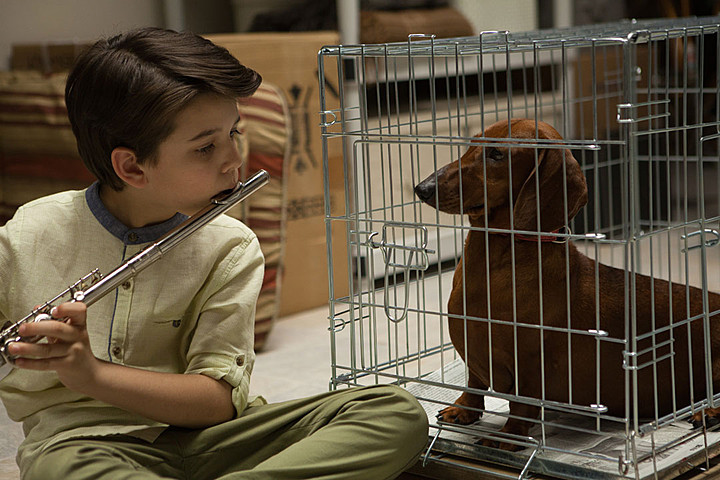WIENER-DOG Review

Director: Todd Solondz
Genre: Comedy
Year: 2016
What an amusing and interesting year this is shaping up to be for independent comedies out of Sundance. The divisive, uproarious, and uplifting SWISS ARMY MAN ran the full gambit from development in Sundance Labs a few years back to premiering at the festival, to tremendous effect. (You can read my complete thoughts on it here.) Also premiering at Sundance this year, though this time from veteran independent auteur Todd Solondz (of WELCOME TO THE DOLLHOUSE and HAPPINESS notoriety), we have yet another bizarre, niche comedy, which may be intentionally more divisive than SWISS ARMY MAN, and is certainly intended to appeal to only a very specific audience.

What could possibly ruin the whimsy of flutes and pups?
If you happen to fall into that audience, namely cynical film junkies under the age of 40, chances are incredibly high that you will be both deeply amused and deeply disturbed by what WIENER-DOG has to offer. That being said, fans of Solondz’ balls-to-the-walls style of crafting immensely perverse scenarios for his characters may find themselves slightly underwhelmed by the relatively tame subject matter present in this film. Simultaneously, if you fall out of the very specific demographic, it’s undeniable that you’ll probably find Solondz’s latest outing at best baffling and at worst insulting. WIENER-DOG’s primary goal is subverting audience expectations of “adorable dog movies,” so it’s understandable that the film currently sits with a 66 on Metacritic and infamously received boos and walkouts from its Sundance audience.
This mixed reception probably has a lot to do with the fact that WIENER-DOG is not so much about an adorable dog as it is about the selfish, messy ways humans use dogs as a social tool when their own abilities to connect with others fail. The conceit of the film is built on the titular dachshund passing from one owner to the next in a series of vignettes, participating in each owner’s life differently depending on that owner’s specific needs. Over the course of the film, the dog helps a boy with cancer learn about mortality, helps a woman find a man she thinks she can love, helps a failed film professor attempt a shot at redemption, and accompanies an old woman as she faces her imminent death. It would spoil the plot to tell you how those situations resolve themselves, but it is curious how Solondz manages to insert the dog into these various scenarios and change the lives of the characters around it.
I use the term “it” in describing the dog very intentionally, because Solondz very willfully refuses to anthropomorphize the dog by granting it real wants or desires of its own. The dog is cute, so we as an audience readily want to see it be treated well, but Solondz actively works to constantly remind his audience that the dog has no complex will or desire of its own. The dark tragedy belying the ostensible humor of each vignette is that each person who comes into possession of the dog does so in an attempt to avoid and escape some grave issue in their life. Many audience members may be rendered personally offended by this distinctly “un-Disney-fied” look at domestic animal ownership, but it is an objectively honest perspective. It is an odd sensation Solondz ends up generating; essentially, if you laugh at the characters he satirizes, you are by extension laughing at your own desire for four-legged companionship. The way Solondz presents it, you don’t really want a dog, you just want a little being to be your friend and never make you own up to your own flaws.

You don’t love this dog, you just love how it temporarily relieves your own terror
Solondz’s satire certainly does border on the cruel. WEINER-DOG delights in putting children and the mentally handicapped in compromising, inappropriate situations, both of which occur in this film, whether he crosses a line in these scenarios is of course entirely left to the taste of the viewers. In both of those scenarios, however, the child and the mentally handicapped adults are not the butt of the joke, rather the “adults” who should be behaving better than they choose to. (And, to reiterate, Solondz’s fans should not expect him to reach the level of the infamous father-son conversation from HAPPINESS.) Beyond personal taste, the sequence which really feels bitter and unnecessary is Solondz’s satirization of film schools and film professors. It’s certainly provocative, especially considering that he personally teaches at NYU, but it’s hard not to feel like he overshoots the mark more than a little, seeming to target specific individuals with a vitriol that feels more than a little unfair.

But hey, do what you gotta do to get DeVito in your picture
One thing Solondz absolutely deserves credit for, however, is his evocative and masterful direction, he still has an astute ability to pull layers of pained subtext out of his actors’ every gesture and expression, a captivating sight to behold from scene to scene. Overall, it’s a work that should delight any audience member willing to go into the experience looking to be shocked and provoked. It may not be as heartfelt as SWISS ARMY MAN, but for anyone looking for a truly out of the box comedy, this certainly should scratch the itch. For those looking to bond with a pup blown up to fit the silver screen, it’s probably best to look elsewhere, or at the very least turn away for the climactic finale.
Verdict: Recommend



